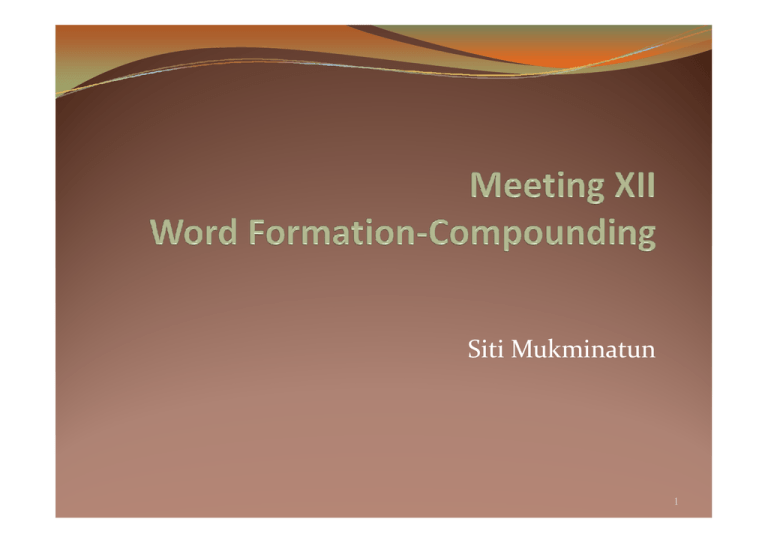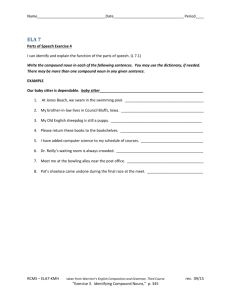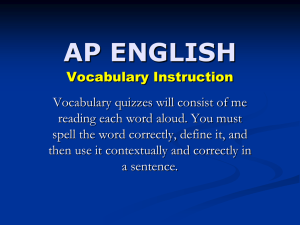Morphology_Meeting XII.pdf
advertisement

Siti Mukminatun 1 Compounding The combination of lexical categories (nouns, adjectives, verbs, or prepositions) to create a larger word. There are two kinds of compound: 1. endocentric 2. exocentric 2 Endocentric vs Exocentric Compounds a. Endocentric compound : denotes subclass of head. Ex: spoon feed (feed with a spoon), teaspoon (spoon for tea) Plural involves making plural of head, even it’s irregular ex: wisdom teeth= type of teeth, plural ‘teeth’ rather than *wisdom tooths, 3 Endocentric vs Exocentric Compounds b. Exocentric compound: denotes something else. e.g. redneck, redhead (not a red head, but a person with red hair. Plural usually involves standard ‘s’ plural marker on the end of the entire word. e.g. walkman ≠ type of men, plural ‘mans’ rather than *walkmen 4 Endocentric vs Exocentric Compounds • Compounding can interact with derivation: a derived word can be part of a compound e.g. availability list, teenage employment • Compounds can be formed from other compounds – Recursion 1. N1 + N2→ N3 (dog + food= dog food 2. N3 + N4 → N5 (dog food + box = dog food box 5 Types of compound 1. compound noun a. noun + noun. This is the largest sub grouping of compound and the majority of in this class is endocentric compound The exocentric type is very limited in productivity. e.g. hatchback and skinhead 6 compound noun appositional compound: the first element marks the sex of a person (productive) e.g. boy-friend, manservant, woman doctor. And some pronominal sex markers used for animals; she-goat, he-cheetah. Dvandva compounds are not commonly used in English. However, this type is occasionally coined. e.g. panty-hose. Example from business mergers: Cadbury-Schweppes, Rank-Hovis-McDougal, Rowntree-Mackintosh. 7 Endocentric It is made up of gerund + noun. It could be treated as N + N or V+N e.g. a fishing rod ‘rod for fishing’ just as a bath towel ‘a towel for the bath’ A shooting match ‘a match in which there is shooting’ just as goods train ‘a train in which there are goods’ 8 Recent example: holding pattern, parking orbit, queuing theory The first element of the compound is a proper noun. Some others contain place name. e.g. Lie algebra, Mao flu, Utah effect. Two common nouns. This is the most productive. e.g. acid rock, domino theory, bang zone, family planning, suicide seat 9 Compound Noun b. verb + noun The noun is the direct object of the verb (all are exocentric) e.g. cut-throat, kill-joy, pickpocket, spoil-sport (denoting people), breakfast and dreadnought (not denoting people) The noun is not the direct object of the verb. (all are endocentric and definitely productive) e.g. crashpad, giggle-smoke, hovercraft, jump jet, play pit 10 Compound Noun c. Noun + verb : The problem : knowing whether the second element is a noun or a verb e.g. nosebleed, sunshine it does not appear to be productive e.g. birth control, nosedive 11 Verb + verb : Compound this patternNoun is extremely rare e.g. make-believe (this pattern is rare) d. e. Adj + Noun : The problem: the difficulty to decide whether it is classified as compound or phrase. The criterion : stress Compound: stress on adjective ‘deep’ structure (very limited) Phrase ; stress on noun, deep ‘structure’ e.g. fast-food, hard-stuff, software 12 The difference between compound and noncompounds a. stress 1. compounds: stress on 1st component. e.g. blackboard 2. non-compounds: stress on the 2nd component. e.g. black board b. Modifier 1. compounds: can’t take modifier on non-head e.g. *a very blackboard 2. non-compound: can take modifier on non-head: a very black board 13 Compound Noun f. Part + Noun Quite productive e.g. afterheat, in-crowd, off-islander, off-offBroadway, over-kill g. Adverb + noun very restricted pattern, partly because only adverbs of time or place occur in such compounds. e.g. now generation 14 Compound Noun h. verb + particle The majority of words are nominalizations of phrasal verbs. e.g. drop-out, press-down, put-down, put-on, cop-out Minor pattern : the particle precedes the verb, e.g. throughtput Not derived from phrasal verb but may be coined by analogy with phrasal verbs, e.g. fallout, pray-in, teach-in i. Phrase compounds The problem: whether it is classified as compounds or lexicalizations of syntactic structures. Endocentric phrase 15 Formed by back-formation or conversion from Compoundnouns. Verb compound Rather rare a. Noun + verb Arise from back-formation and conversion e.g. carbon-copy (conversion), blockbust, carbondate, colour-code, sky-dive b. Verb + verb Exceedingly rare. e.g. typewrite (maybe), trickle-irrigate (backformation from trickle-irrigation, make do, dare 16 say Compound Verb C. Adjective + verb Through back-formation or conversion) Relatively productive e.g. double-book, fine tune, soft-land, free associate 17 Compound Verbs d. Particle + verb Some may be back-formation but most seem to be genuine verbal formations. e.g. outachieve, overachieve, overbook, overeducate, overmark (an exam paper) e. Noun +noun Not particularly common Arises from conversion of a compound noun e.g. to breath-test 18 Compound Adjectives 3. compound adjectives a. Noun + adjective The most frequent type It would be possible to distinguish between participle and other adjective e.g. capital-intensive, card-carrying, host-specific, machine readable b. verb + adjective It is rare and may be new. e.g. fail safe 19 Compound Adjectives c. adjective + adjective 1) appositional compound e.g. bitter-sweet, deaf-mute, (classic), proam, 2) endocentric ones Normally endocentric Productive e.g. open-ended, ready-made, double-helical 20 Compound Adjectives d. adverb + adjective Not particularly common A more common type has a particle as the first element e.g. over-qualified, uptight e. Noun + noun Exocentric They function as adjectives but their second (head) element is not an adjective. e.g. back-street (abortionist), coffee-table (book), glassteel (sky-scraper) 21 Compound Adjectives f. adjective+ noun The most productive Compound or noun phrase? Recent example : grey-collar, red-brick (university), solid-state (physic) g. particle + noun Prepositional phrase is converted to a modifier. e.g. before-tax (profit), in depth (study) 22 Compound Adverbs The most common way is by the suffixation of –ly to a compound adjective. Other patters are found. e.g. double-quick, flat-out, off-hand, over-night 23








